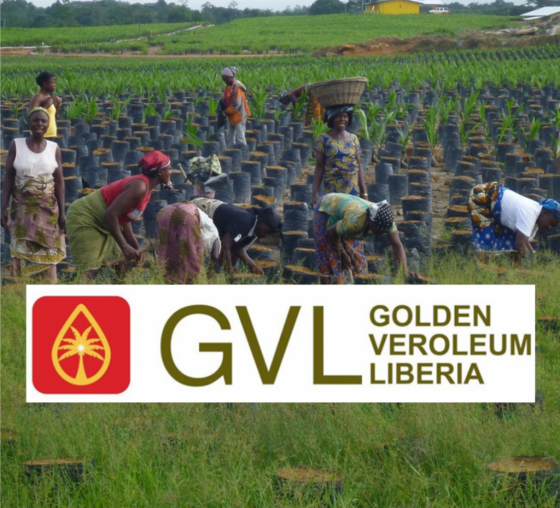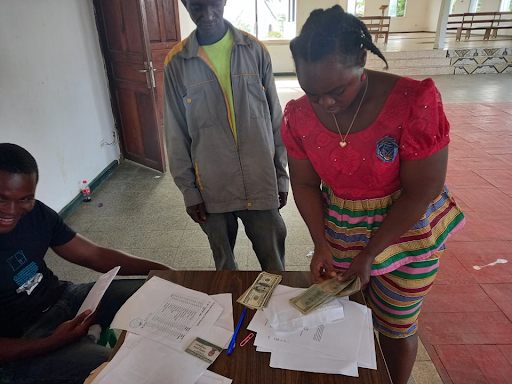GVL Pays US$35K for Illegal Dismissals

-- SDI, Milieudefensie says the settlement is a win for the employees who had to struggle with income losses
Golden Veroleum Liberia (GVL) has paid 16 employees unfairly dismissed six years ago U$35,541 as compensation.
GVL prematurely dismissed the workers for allegedly participating in a riot that destroyed the company’s properties in Butaw, Sinoe County in May 2015, leading to the death of a worker.
The riot started during a protest action by Butaw residents against rights violations by GVL – leading to the arrest and imprisonment of the 16 workers without any trial for one year – as one of them passed away during the process. They were released on bail when no evidence was found to substantiate the complaints, but GVL did not accept them back into the workforce.
However, they were not paid salaries while in prison even though they were not formally sacked, and after three years of complaining, a suit was filed against GVL with the Sinoe County Labor Office – forcing the Singapore-listed company to negotiate a settlement plan.
The case against GVL stands as a sign of hope and sets a precedent for Liberians and communities in other countries that resist rights violations and destructive practices from the multinationals occupying their customary lands. It also serves as a deterrent for other concessionaires and encourages them to recognize the rights of local communities.
The settlement, according to Sustainable Development Institute (SDI), which supported the 16-employees during the case, is a win for the employees who had to struggle with income losses as well as reputational damage, negatively impacting their families and livelihoods.
SDI head of programs, James Otto noted that it is time that corporate institutions uphold the United Nations Guiding Principles on Business and Human Rights and commit themselves to respect the rights of locals.
“Our government needs to ensure that corporate institutions comply with laws and international best practices,” he added.
Local communities affected by the plantations from Golden Veroleum Liberia have filed several complaints over the past years in collaboration with civil society organizations. Two complaints are still running. One with the Roundtable on Sustainable Palm Oil (RSPO) about the lack of free prior and informed consent from communities and environmental studies.
In another complaint procedure, the High Carbon Stock Approach determined GVL should provide a remedy for clearance of potentially one thousand hectares of valuable forest.
The workers in their complaint claimed “constructive dismissal and unfair labor practice,” and that they were verbally told of their dismissals and denied access to their workplaces. However, the Sinoe Labor Office ruled against GVL and urged the company to reinstate or negotiate with the dismissed employees, but GVL rejected the report and requested a transfer of the case to Monrovia, where labor authorities intervened after it moved to a full-scale investigation.
The case finally reached a conclusion after authorities at the Labor Ministry found GVL guilty and urged the company to settle with its ex-workers.
GVL, Liberia’s largest oil palm company, holds 220,000 hectares of land in Sinoe, Maryland, and Grand Kru for 65 years in a 2010 deal worth US$1.6 billion. But communities are not happy about its operation. GVL’s decade and a year stay in Liberia has seen its oil palm production engulfed by issues of land grabs, complaints of bad labor practices, and reports of deforestation.
Sunday Okusu Sackor, one of the community members that received the financial compensation said “We hope that this victory can inspire others to join forces with lawyers and civil society to stand up and use all legal means to achieve access to justice.”
He added the settlement process was a long journey since 2015, but finally they have some compensation for the wrongdoings against them. “We will continue to demand the company to improve its practices and where necessary request the government of Liberia to step in and ensure our rights are protected and promoted,” Sackor added.
Larry Noah, a labor inspector in Sinoe, described the workers’ legal victory over GVL as an important milestone in the country’s quest for fair labor practice.
“Our report from the investigation shows that the workers were never served a letter of dismissal,” Noah said as reported by the website GNN. “It also showed that the workers were not investigated internally and found guilty of the charges brought down against them by the GVL, and all of this went contrary to the labor law of Liberia.”
Sampson Williams, also from SDI, added that the financial compensation is welcoming after many years of struggles and a process with the Ministry of Labour, which the GVL constantly dragged and undermined., “the victims finally achieved some level of justice and compensation.”
Meanwhile, Danielle van Oijen, from Milieudefensie, added that the struggle is connected to thousands of other struggles from communities and activists around the world against the system of industrial monoculture plantations.
“The victory can inspire others to stand up and claim their rights. But the plantation sector is known for its structural rights abuses and environmental harms,” he said. This week, governments have a chance to fix that and negotiate for a strong UN Binding Treaty on Business and Human Rights that provides access to justice.”

